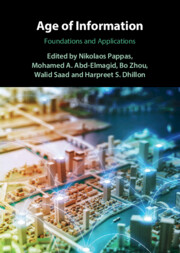Book contents
- Frontmatter
- Contents
- Contributors
- Acknowledgments
- 1 The Probability Distribution of the Age of Information
- 2 On the Distribution of AoI
- 3 Multisource Queueing Models
- 4 Controlling the Age of Information: Buffer Size, Deadlines, and Packet Management
- 5 Timely Status Updating via Packet Management in Multisource Systems
- 6 Age of Information in Source Coding
- 7 Sampling and Scheduling for Minimizing Age of Information of Multiple Sources
- 8 Age-Efficient Scheduling in Communication Networks
- 9 Age-Driven Transmission Scheduling in Wireless Networks
- 10 Age of Information and Remote Estimation
- 11 Relation between Value and Age of Information in Feedback Control
- 12 Age of Information in Practice
- 13 Reinforcement Learning for Minimizing Age of Information over Wireless Links
- 14 Information Freshness in Large-Scale Wireless Networks: A Stochastic Geometry Approach
- 15 The Age of Channel State Information
- 16 Transmission Preemption for Information Freshness Optimization
- 17 Economics of Fresh Data Trading
- 18 UAV-Assisted Status Updates
- Index
15 - The Age of Channel State Information
Published online by Cambridge University Press: 02 February 2023
- Frontmatter
- Contents
- Contributors
- Acknowledgments
- 1 The Probability Distribution of the Age of Information
- 2 On the Distribution of AoI
- 3 Multisource Queueing Models
- 4 Controlling the Age of Information: Buffer Size, Deadlines, and Packet Management
- 5 Timely Status Updating via Packet Management in Multisource Systems
- 6 Age of Information in Source Coding
- 7 Sampling and Scheduling for Minimizing Age of Information of Multiple Sources
- 8 Age-Efficient Scheduling in Communication Networks
- 9 Age-Driven Transmission Scheduling in Wireless Networks
- 10 Age of Information and Remote Estimation
- 11 Relation between Value and Age of Information in Feedback Control
- 12 Age of Information in Practice
- 13 Reinforcement Learning for Minimizing Age of Information over Wireless Links
- 14 Information Freshness in Large-Scale Wireless Networks: A Stochastic Geometry Approach
- 15 The Age of Channel State Information
- 16 Transmission Preemption for Information Freshness Optimization
- 17 Economics of Fresh Data Trading
- 18 UAV-Assisted Status Updates
- Index
Summary
This chapter considers an application of age of information called AoCSI in which the channel states in a wireless network represent the information of interest and the goal is to maintain fresh estimates of these channel states at each node in the network. Rather than sampling some underlying time-varying process and propagating updates through a queue or graph, the AoCSI setting obtains direct updates of the channels as a by-product of wireless communication through standard physical layer channel estimation techniques. These CSI estimates are then disseminated through the network to provide global snapshots of the CSI to all of the nodes in the network. What makes the AoCSI setting unique is that disseminating some CSI updates and directly sampling/estimating other CSI occur simultaneously. Moreover, as illustrated in this chapter, there are inherent trade-offs on how much CSI should be disseminated in each transmission to minimize the average or maximum age.
Keywords
Information
- Type
- Chapter
- Information
- Age of InformationFoundations and Applications, pp. 384 - 405Publisher: Cambridge University PressPrint publication year: 2023
Accessibility standard: Unknown
Why this information is here
This section outlines the accessibility features of this content - including support for screen readers, full keyboard navigation and high-contrast display options. This may not be relevant for you.Accessibility Information
- 2
- Cited by
